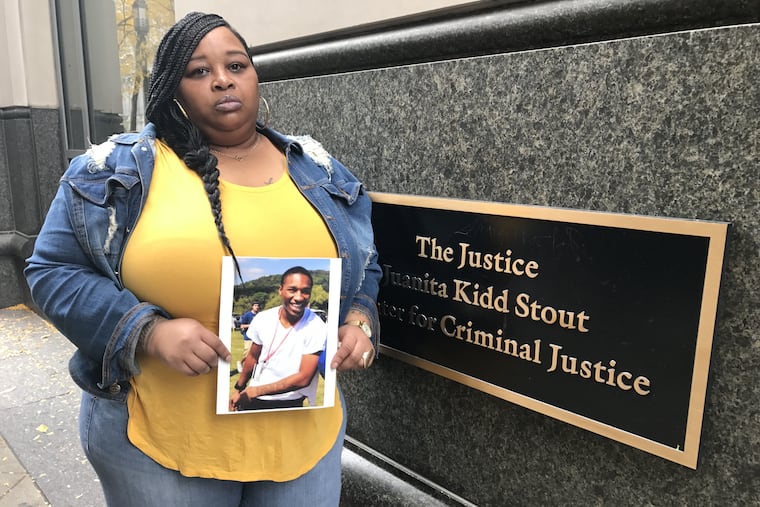Juvenile lifer resentenced to 38 years to life in prison for fatal shooting on Memorial Day 2012
Robert Shabazz-Davis was resentenced to 38 years to life in prison by Judge Sandy Byrd, who said he saw "no remorse" in the defendant.

A Philadelphia man who was 16 when he fatally shot a 20-year-old man twice in the back on a North Philadelphia street seven years ago was resentenced Friday to 38 years to life in prison.
Robert Shabazz-Davis, 24, told Common Pleas Court Judge Sandy Byrd that “I’ve grown a lot” and “I express sorrow” for the Memorial Day 2012 shooting of Antwan Pack of North Philadelphia.
But the judge said, “I’ve seen absolutely no remorse from the face of this young man. It troubles me.”
Byrd, who is retiring at the end of the year, said he was giving a guideline sentence to Shabazz-Davis because he did not want the case to return to court on appeal.
In March 2015, Byrd sentenced Shabazz-Davis to life in prison without parole after considering the U.S. Supreme Court decision in Miller v. Alabama, which said that life sentences for those under 18 should be rare and only imposed when the defendant is found to be irreparably corrupt. At that hearing, Byrd had said he found Shabazz-Davis to be “one of those rare cases.”
But the Pennsylvania Supreme Court in June 2017 ruled in Commonwealth v. Batts that for a juvenile to be sentenced to life, the state must “prove, beyond a reasonable doubt, that the juvenile offender is permanently incorrigible and thus is unable to be rehabilitated.” Superior Court then sent the case back to Byrd last year for resentencing.
Assistant District Attorney Chesley Lightsey, in an Oct. 10 sentencing memorandum, wrote that the District Attorney’s Office was seeking the mandatory minimum sentence of 35 years to life in prison for Shabazz-Davis and that her office “concedes that it is not able to meet” the new burden under Batts.
In court Friday, Lightsey amended her request, saying she was not asking for any specific sentence.
Defense attorney Richard Bobbe asked the judge to sentence his client to the mandatory minimum, expressed sympathy to the victim’s family, and told the judge his client is “a far different person” now.
About 15 relatives and friends came to court for each side.
The victim’s family, in letters and in person, told the judge that Pack had been a good young man who never got arrested, and who was enrolled at Northampton Community College after graduating from Benjamin Franklin High School. He was working in a nursing home and would arrive to work early to play chess with residents.
“I don’t understand what could warrant him being shot in the streets,” his aunt Rhonda Pack Terry said. She asked the judge to give Shabazz-Davis “whatever it is he deserves.”
The victim’s mother, Melva Pack, 45, recalled that her son was a “wonderful person” with a “smile that brightened our day.”
After the hearing, she said she appreciated that the judge had not given Shabazz-Davis the minimum sentence.